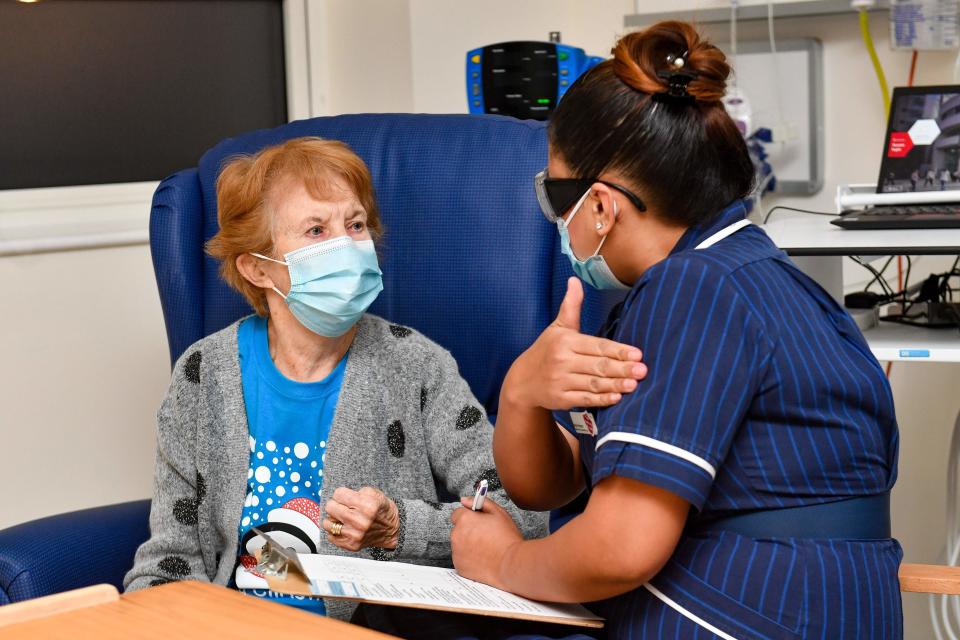When can I get the coronavirus vaccine?

Boris Johnson issued an update on the progress of the vaccine rollout during his lockdown announcement on Monday night.
Mr Johnson said he was sharing the “realistic expectations” for the NHS programme in the coming weeks, as he put the nation back into a full lockdown to curb rising coronavirus case numbers.
"By the middle of February, if things go well and with a fair wind in our sails, we expect to have offered the first vaccine dose to everyone in the four top priority groups identified by the Joint Committee on Vaccination and Immunisation.
“That means vaccinating all residents in a care home for older adults and their carers, everyone over the age of 70, all frontline health and social care workers, and everyone who is clinically extremely vulnerable.”
The prime minister said if we “succeed” in vaccinating all those groups then we will have removed “huge numbers of people” from the path of the virus.
The UK was the first country in the world to approve the vaccine candidate put forward by Pfizer and its German partner BioNTech, and later the Oxford/AstraZeneca vaccine too.
At the start of December, Maggie Keenan, 90, was the first person in the world to have the vaccine at Coventry hospital. Followed by William Shakespeare from Warwickshire.
The draft priority list for the vaccine has long placed care home residents, care workers, and NHS staff at the top. Followed by the most elderly and vulnerable in descending age.
But how do you know when you’re eligible to book a vaccine? Will you be contacted by your GP automatically when it is ready or will the news be shared, for example, in Downing Street press briefings?
When am I due the vaccine?
On 2 December it was confirmed by the government’s Joint Committee on Vaccination and Immunisation that first in the queue would be residents and staff in care homes for the elderly. Shortly followed by those age 80 and over and frontline health and social care workers.
Next comes those aged 75 and over in the third level. In the fourth band are those aged over 70, as well as all adults who are classed as clinically extremely vulnerable.
The fifth band will be for those aged over 65; and the sixth for all adults in at-risk groups. Next will be over-60s; then the over-55s; and then the over-50s.
After that, the vaccine will be available for the wider population for those over the age of 16. Most children under the age of 16 will not get the vaccine even when fully rolled out.
How will you know when you can get the vaccine?
Boris Johnson said on Monday that the government is aiming to have worked through the first four groups on the list by the middle of February.
But for the meantime, people are being told to wait to be contacted.
“The NHS will let you know when it’s your turn to have the vaccine,” says the government. “It’s important not to contact the NHS for a vaccination before then.”
As with other routine vaccinations like the annual flu campaign, or children’s pre-school jabs, people will either be contacted by letter or call from their GP. So, for now, wait to be contacted.
The regular Downing Street press conferences will also likely give you an idea of what stage of the rollout the NHS is currently working through and whether they are keeping to the timetable set out on Monday.
How will the vaccine be administered?
The vaccine is most likely to be administered at your GP surgery. If you work or live in a care home, or work on the frontline in a hospital or medical setting, you could get the vaccination in that setting instead.
Individual vaccination hubs are also currently being set up around the country as well. The vaccine is being rolled out on the NHS, not privately.
The NHS is currently recruiting 30,000 volunteers to help with administering the vaccinations.
How are vaccines usually done?
The NHS has a lot of experience when it comes to vaccinating large numbers of people. This winter, the flu jab is expected to reach 30 million people, for example. This is double the number normally vaccinated.
There are some that are usually given to children, such as the MMR vaccine, and others that are typically administered to elderly people, such as the shingles vaccine.
Additional vaccinations are administered to people before they travel abroad to certain foreign countries. These can be requested either through your GP or at a travel clinic.
Read More
Who will get Pfizer vaccine first and where is it being made?

 Yahoo Finance
Yahoo Finance 